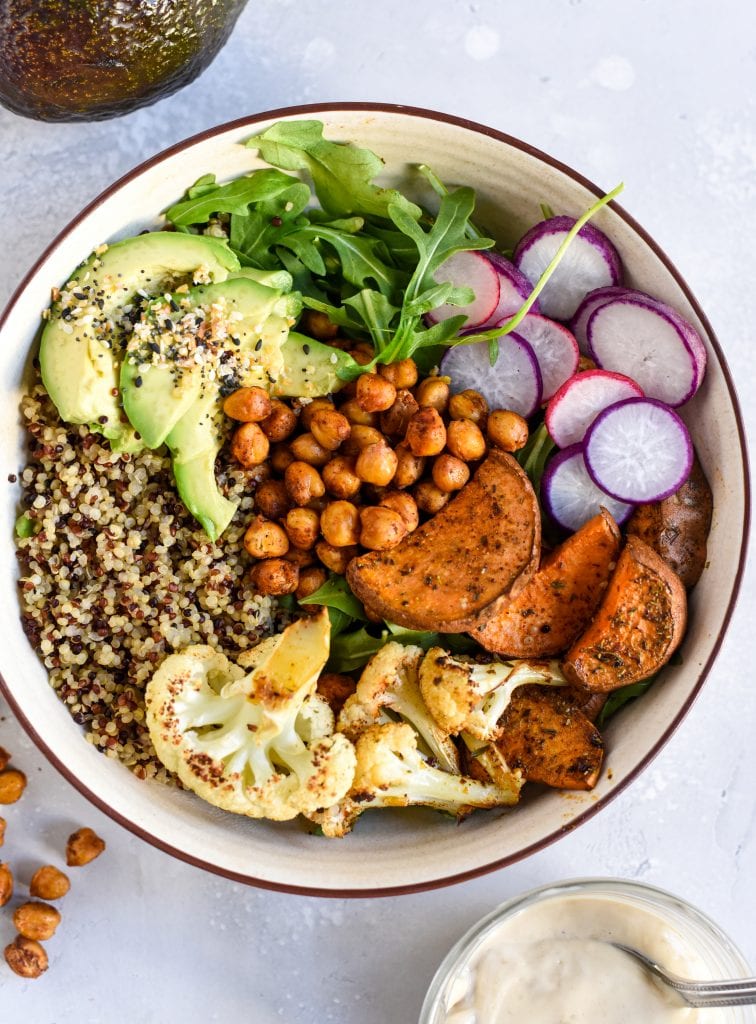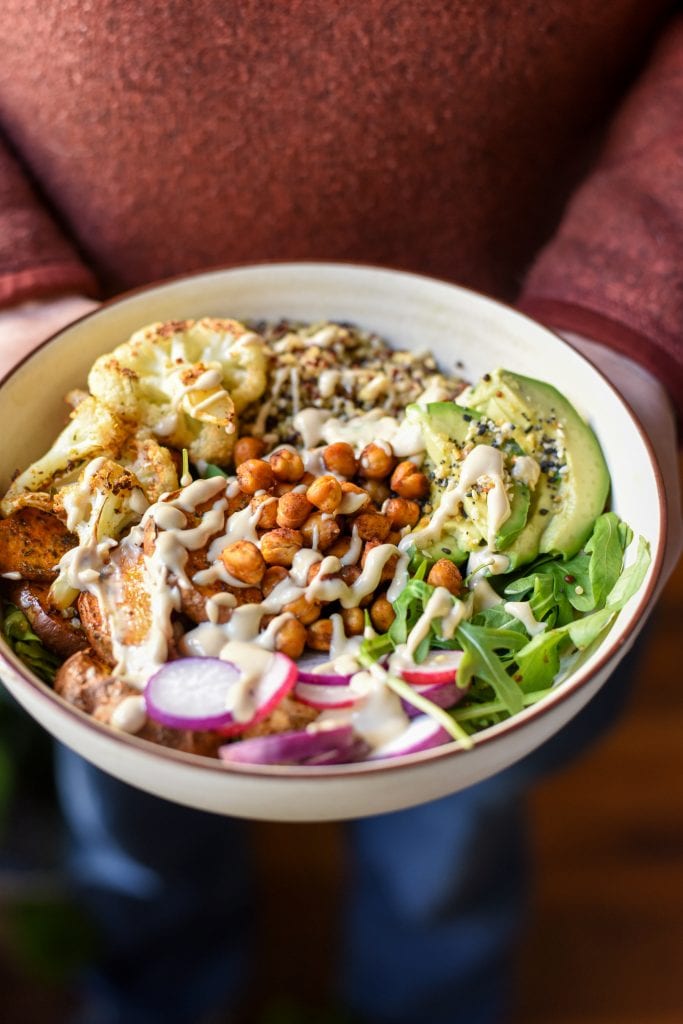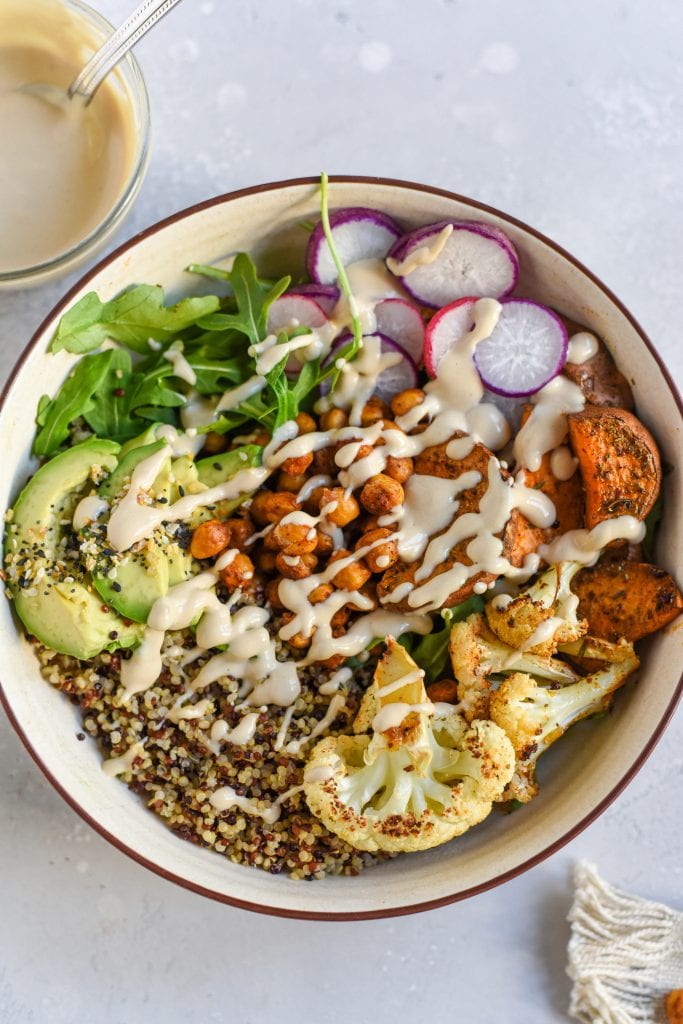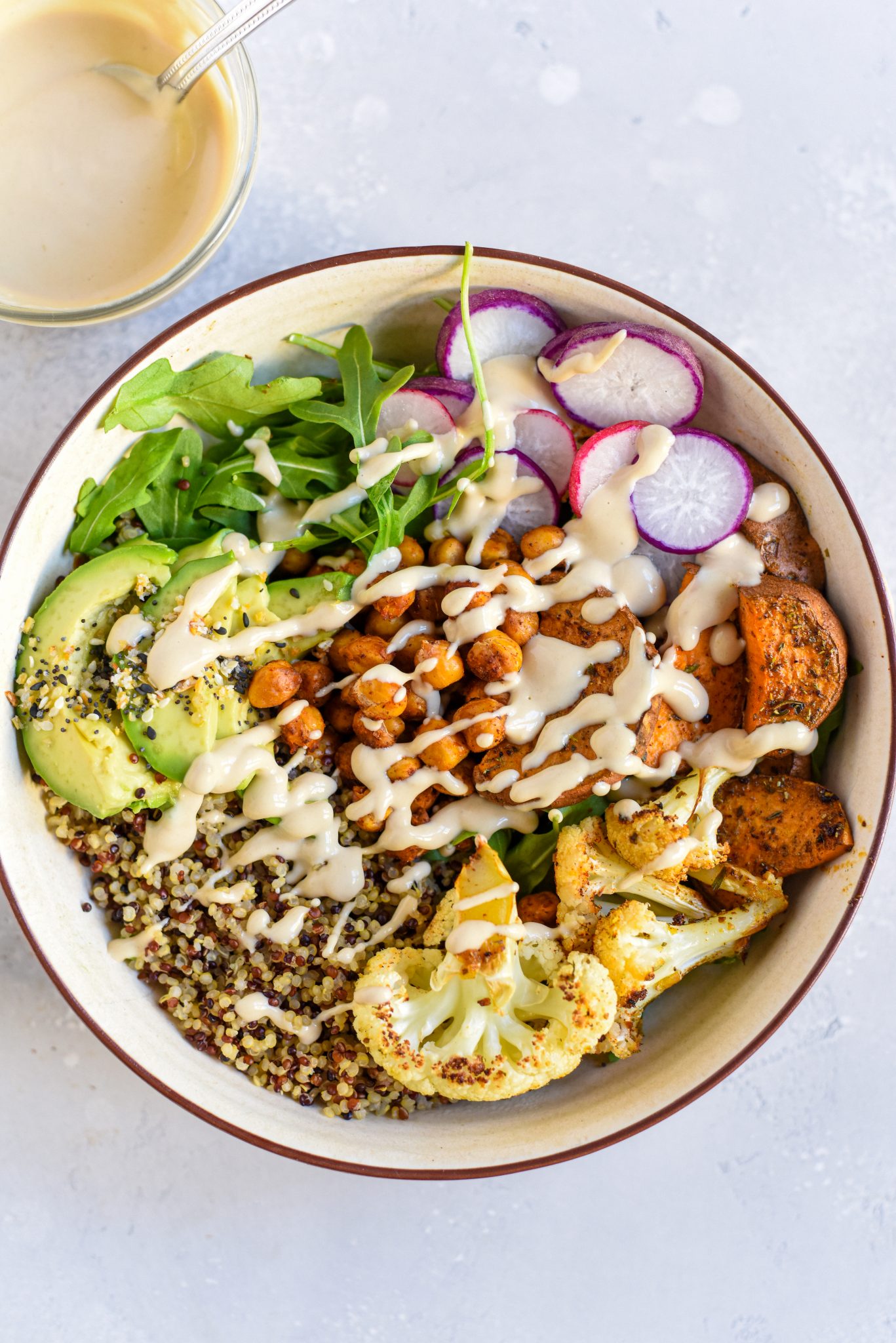When it comes to balancing hormones, nutrition & healthy habits can absolutely play a role in keeping them in balance.
Enter this delicious Hormone Balancing Nourish Bowl — a balanced meal packed with delicious ingredients, vitamins, minerals, fiber, and plant-based protein to support healthy hormone balance. Read below for some of our main hormones and how we can support them!

So, what exactly are hormones? Hormones are chemicals in our body that control many functions such as hunger, thirst, energy levels, activity, emotions, fertility, sleep, and stress. All of our hormones are connected, so when one becomes out of balance, this can set off a cascade in our body. I like to compare it to a group of cheerleaders – if one is out of sync in the routine, it throws the entire thing off! As an imbalance occurs, our body signals this to us through a variety of symptoms such as menstrual pain, stress, constipation or GI issues, fatigue, fertility issues, extreme food cravings, hair loss, and acne to name a few. Hormones are secreted by glands, such as the ovaries, testes, pituitary, adrenal, thyroid, and more.

What are some basic hormones that nutrition plays a role in?
Insulin & Cortisol
- Insulin
- is a hormone secreted by the pancreas in response to consuming any type of carbohydrate. Its role is to take the glucose into the cells to be used as energy. When insulin becomes out of whack, it can cause insulin resistance, which essentially means insulin isn’t as effective at its job, leading to higher blood sugar levels.
- Most people have heard of Diabetes Mellitus, which has two subtypes: DM type 1 in which pancreas cannot secrete ANY insulin and must rely on insulin meds. And Type 2, when insulin resistance occurs and insulin has a harder time doing it’s job.
- Overall blood sugar control is important for mood regulation, maintaining a healthy weight, and controlling cravings. One of the BEST ways to balance blood sugar? By eating enough, and not skipping meals! We need to eat consistently throughout the day to balance blood sugar – consuming a balance of carbs, protein, and fats at meals and aiming to eat something every 3-5 hours or so. Ever waited too long to eat, only to feel HANGRY, and overeat? This has to do with blood sugar!
- And remember, our bodies NEED carbohydrates. Often, when I see clients in the hospital with Diabetes, they believe they need to cut carbs out completely. This couldn’t be farther from the truth! It’s about choosing complex carbs more often when we can (gentle nutrition), making peace with carbs that you may over-consume or have a poor relationship with, and balancing carbs with other important macros like proteins and fats. Our brains run exclusively on carbs, so we absolutely still need the majority of our energy to come from carbs.
- Insulin
- Cortisol
- Also known as the “Stress hormone”. Cortisol is secreted by our adrenal glands and is good for us in small doses to help fight off infection, stay alert, etc., but chronic elevated cortisol can lead to weight gain, elevated blood sugar, elevated blood pressure, and inflammation.
- What are some signs and symptoms of high cortisol? Weight gain, acne, irritability, flushed face, easy bruising, high blood pressure, more prone to infections, severe fatigue, and headaches. You CAN get your saliva or urine cortisol levels checked to see if it is out of balance.
- What can help keep these two hormones in balance:
- Balanced, regular meals-no skipping meals or restrictive eating!
- Focusing on having a healthy relationship to food- anxiety & stress eating what you think are “unhealthy foods” only leads to poor digestion and increased cortisol levels. We could argue that the stress & anxiety around certain foods is actually worse for you than the food itself! Research has shown that intuitive eating aids in decreasing blood sugar levels and decreased stress.
- Research has shown that even logging food and calories in apps like My Fitness Pal leads to increased cortisol – excess cortisol is linked to weight gain, insulin resistance, and inflammation. Diets only do more harm than good (not to mention they don’t even work for 95% of people).
- One study found that restricting food intake to less than 1,200 calories per day led to increased cortisol levels. Our bodies get stressed out when we don’t have enough to eat. So honor your hunger and avoid any restrictive dieting – work with a Dietitian if you need support!
- Interestingly, a study from 1996 even suggests that very low-calorie diets could potentially trigger insulin resistance in some people, an effect you might expect to see in people with diabetes.
- Stress Management
- Journaling, yoga (my personal favorite!), therapy, deep breathing, whatever works for you! Managing stress at the root is very important.
- Another tip is balancing intense exercise (like HIIT and boot camps) with low intensity exercise – we want balance! TOO much HIIT (think- going to orange theory or something similar every day) contributes to increased cortisol and inflammation. Lower intensity exercise such as yoga, walking, and pilates is wonderful when you have elevated cortisol. This is a great reminder for anyone struggling with exercise compulsion – is it really healthy to work out every day if you’re just further stressing out your body?
- Have a pet? Taking care of and loving your pets is linked with decreased stress and cortisol levels. I have 3 – I know this to be true. 🙂
- Adequate sleep – important for natural blood sugar and cortisol balance. Overtime, chronic sleep deprivation leads to elevated cortisol levels. Try essential oils, turning electronics off before bed, any nighttime routine that helps your sleep!
- Whole grain/ Fiber-rich carbs such as brown rice, quinoa, whole grains, oatmeal, buckwheat, farro, popcorn, etc.
- Contributes to balanced blood sugar and reducing cortisol levels!
- Make sure you stay hydrated, too. Dehydration can also lead to elevated cortisol levels.
- Probiotics and prebiotics for gut health – these have also been linked to decreased cortisol levels.
- Probiotic sources: kimchi, kefir, yogurt, sourdough bread, kombucha, sauerkraut, anything fermented!
- Prebiotic sources: banana, artichoke, leeks, garlic, chicory root, etc.
- Supplements – fish oil and ashwaganda does have some promising researching showing they can help reduce stress and cortisol levels in the body. Do your own research, but it is promising! They even have powdered ashwaganda I love to add to my smoothies. Food should be implemented first and foremost, but supplements may potentially be heplful – always consult your doctor before adding any supplements into your routine.
- Cortisol
Hormone Balancing Nourish Bowl
This delicious spring nourish bowl is packed with anti-inflammatory ingredients, protein, and healthy fats, all helpful for balancing our hormones such as ghrelin, leptin, cortisol, and insulin. This bowl is packed with flavor and foods to keep you full and satisfied. Drizzled with a creamy lemon tahini dressing!
- Prep Time: 10 min
- Cook Time: 45 min
- Total Time: 55 minutes
- Yield: 4 servings 1x
Ingredients
For the bowl:
- 1 cup cooked quinoa
- 1 large bunch arugula/kale/leafy greens
- 1 sweet potato
- 1 head of cauliflower
- 1/8 cup raw pumpkin seeds
- 1/8 cup nuts of choice, crushed
- 1 cup radishes, sliced thin
- 1 avocado
- seasonings for the roasted chickpeas, sweet potato, & cauliflower (Add more if needed):
- 1/2 tsp sea salt & black pepper
- 1/2 tsp garlic powder
- 1–2 TBSP nutritional yeast
- 1 tsp italian herbs
- 1/2 tsp smoked paprika
For the Tahini Sauce:
- 1/4 cup tahini
- 2 TBSP maple syrup
- 1 tso miso paste
- juice of 1 lemon
- 1 TBSP sesame oil
- 1/2 tsp salt (or more to taste)
- 1/2 tsp garlic powder
- 1/3 cup warm water to thin
Instructions
- Preheat oven to 400 degrees and line two baking sheets with aluminum foil and set aside.
- Cook quinoa according to package directions (Typically 1/2 cup dry quinoa with 1 cup water or broth – heated to boiling, turned to a simmer, covered, and cook for 12-15 minutes).
- While quinoa is cooking, chop cauliflower into small pieces and cut sweet potato into half moon shapes. Add to a medium bowl with drained chickpeas, drizzle with 1 TBSP olive oil, and season with all seasonings. Add to baking sheets in one layer. Spray with nonstick spray and bake for 35-45 minutes, stirring halfway through.
- While veggies and beans are roasting, make tahini sauce by adding all ingredients into a food processor and blend until smooth and creamy. Set aside.
- Assemble bowls – add a scoop of quinoa, handful of leafy greens, sliced radishes, and then top with roasted sweet potato, cauliflower, chickpeas. Add sliced avocado and drizzle with tahini sauce. Sprinkle with pumpkin seeds and chopped nuts. Enjoy immediately!
Keywords: vegan, vegetarian, budhha bowl, macro bowl, nourish bowl
A few other hormones:
Ghrelin & Leptin, NPY
- Ghrelin – the “hunger hormone” – increases when we haven’t eaten in awhile to signal us to eat. So when we try to cut calories or avoid hunger, we’re only going to INCREASE our hunger later on due to an uprise in ghrelin. Just like ignoring the urge to pee isn’t helpful or useful, don’t ignore your hunger. 🙂
- Leptin – the “fullness hormone” – increases as we eat to tell our brains that we’ve had enough. Helps us stop eating when we are full and satisfied.
- Sleep greatly affects these hormones – when we skimp out on sleep, our ghrelin increases and leptin decreases, making it feel like you just can’t stay satisfied or full all day! Which is why sleep is SO important for an overall healthy lifestyle. Do what works best for you – whether that’s turning off electronics before bed, trying essential oils like lavender, keeping pets out of the bedroom, etc. Sleep is so important.
- Neuropeptide Y (NPY) is actually a neurotransmitter that plays a role in a variety of functions, one being it drives us to consume food, especially carbohydrates. It’s typically highest in the morning and levels fall naturally after eating for “normal” eaters. When we go on a restrictive diet or have disordered eating, especially if we are “cutting carbs”, it eventually ends up simply leading us to CRAVE more carbs, because of a chronic upswing in NPY. Any diet that cuts out food groups is out of balance, and ends up doing more harm than good. So if you’ve spent a period of time restricting calories, carbs, or all of the above, your body produces higher amounts of NPY, which in turn drives you to want to eat more high-carbohydrate foods.
- Be sure to get protein at most meals and snacks – protein influences the release of leptin and grehlin, protein contributes to feeling full & satisfied. Ever had a meal that consisted of only carbs (like a plain bowl of pasta or a plain bagel?) – when a meal lacks protein (& fat!), we tend to be hungry soon after.
- Work on getting in tune with hunger and fullness – these are 2 of the 10 principles of Intuitive eating, and one of my favorite principles to guide clients through. It’s unfortunately so common to feel disconnected from these cues given a history of dieting, trauma, chaotic/busy lifestyles, or simply just ignoring them for awhile. Think about it – if we ignore our body trying to tell us it needs food repeatedly, of course it’s going to get tired and just stop making those cues. How to get them back? First ensure you are eating regularly. Every 3-5 hours is helpful for getting those hunger cues back in rhythm. Also be sure to challenge the diet mentality by working through intuitive eating, checking in with how your body feels throughout the day, and getting in tune with using the hunger-fullness scale.

Overall, how can we promote balanced hormones via nutrition & lifestyle?
- Fats – consuming fats is integral for creating hormones, as well as triggering the release of hormones that help you feel full and satisfied, including GLP-1, PYY and cholecystokinin (CCK).
- Nuts & seeds
- Whole eggs
- Avocado
- Olive oil
- Fatty fish
- Nut butter
- Chia seeds
- Hemp seeds
- Pumpkin seeds
- Full fat dairy
- Make sure you’re eating ENOUGH and not trying to diet. Women’s bodies especially are very sensitive to scarcity. If your body doesn’t feel like it’s getting enough, it down regulates the production of sex hormones. Your body doesn’t know the difference between a war or famine or that new weight-loss diet you’re following. Dieting and bingeing has been associated with decreased estrogen, decreased thyroid hormone, increased cortisol, and other hormone effects.
- Probiotics & prebiotics for gut health- discussed above!
- Protein
- Any and all sources! Fish, seafood, poultry, turkey, red meat (in moderation), nuts, seeds, tempeh, tofu, soybeans, beans, lentils, greek yogurt, eggs, etc.
- Omega-3 fatty acids
- Nuts like walnuts
- Chia seeds
- Fish-salmon, mackerel, herring, anchovies,
- Oysters
- Soybeans
- Whole grains/fiber rich carbs when we can in place of sugary/refined carbs (this does NOT mean whole grains are “better” or to follow this all or nothing, this is a great way to practice gentle nutrition)
- Magnesium is an excellent mineral for hormone production and regulation while balancing the effects of PMS. Food sources of magnesium include leafy greens, nuts, chia seeds, whole grains, edamame, whole grain cereal.
- Overall balance of meals with Carb- Protein -Fat -Fiber or “CPFF”
- Not avoiding completely, but being mindful of added sugar, alcohol, and refined grains
- Nutrition isn’t all-or-nothing, this doesn’t mean we can’t have these things, it just means you should check in with how often you’re consuming them, make tweaks if you feel better eating a little less of them, and remember it’s what you do most of the time that matters. Having some dessert, wine, and pastries now and then won’t affect your health. Sure, if you drank everyday and binged on sweets daily, then it may affect your health. Oftentimes with my clients, making PEACE with these foods is what helps most, when you remove the “Forbidden” nature of these foods, you tend to want them less since they aren’t as “alluring”, and you can have them when you want! If you struggle with overeating or binge eating on sweets and carbs, intuitive eating counseling would benefit you greatly since trying to restrict sugar or carbs only fuels more overeating and bingeing.
- Movement
- In a 24-week study of women, exercise increased participants’ insulin sensitivity and levels of adiponectin, a hormone that has anti-inflammatory effects and helps regulate metabolism. Joyful movement means finding ways that you can move your body that brings you joy and makes your body feel good. Remember, any movement is movement! What did you like to do as a kid to move your body before “dieting” and “weight” got too intertwined with movement? I loved rollerblading as a kid, so this would be a great way to incorporate gentle movement in! Gardening, walking, hiking, dancing, yoga, biking, do what makes you feel best!
- Fats – consuming fats is integral for creating hormones, as well as triggering the release of hormones that help you feel full and satisfied, including GLP-1, PYY and cholecystokinin (CCK).

Enjoy this delicious nourish bowl – great for meal prep!

Have more questions about balancing hormones? Get in touch.
Get My 20 Favorite Recipes!
Get ready for some yummy food with my 20 favorite recipes. Receive an instant download to inspire you on your journey to nourishment!
Follow me on Instagram!
@CAROLINEGREENNUTRITION

